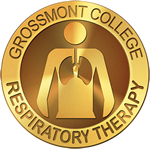General Information
Respiratory Therapists, also known as Respiratory Care Practitioners are allied health professionals trained and educated to care for patients in need of cardio-pulmonary support. Respiratory therapists assess, use diagnostic tests to evaluate, treat, educate, and provide care to patients from birth until the end-of-life. A respiratory therapist has probably provided you with care if you have or have ever had asthma, chronic obstructive pulmonary disease, pneumonia, suffered trauma, delivered a baby prematurely or by cesarean section, suffered a respiratory or cardiac arrest, or needed life support.
All care provided by a respiratory therapist is under the direction of a physician. Seventy-five percent of respiratory therapists work in hospitals, but they are also employed in physician offices, clinics, schools, skilled nursing facilities, sleep labs, research, disease management, and education.
Grossmont College awards an Associate in Science Degree in Respiratory Therapy which is necessary for eligibility to take the registry examinations administered by the National Board for Respiratory Care (NBRC). An Associate Degree in Respiratory Therapy and successful completion of the registry exam are required to obtain a license to practice respiratory therapy in most states.
The continued success of our graduates is evident in yearly statistics collected from CoARC. Grossmont College respiratory therapy graduates pass the Certified Respiratory Therapist (CRT) exam and the Registered Respiratory Therapy (RRT) exam at a higher rate than the proprietary programs in San Diego County. Beginning January 5, 2015 all graduates must pass the RRT exam to obtain a California state license and work in California.
The US Bureau of Labor and Statistics projects employment of respiratory therapists in the United States to grow 19 percent from 2012 to 2022. Growth in the middle-aged and elderly population will lead to an increased incidence of respiratory conditions such as emphysema, chronic bronchitis, and pneumonia (http://www.bls.gov/ooh/healthcare/respiratory-therapists.htm
Mean salaries for respiratory therapists in California is approximately $37.90 per hour. https://www.bls.gov/
Employment Potential
The Department of Labor and Statistics have projected a shortage for respiratory therapists well into the next decade. Because of this shortage, the graduate will encounter many openings in clinics, industry, home health agencies, laboratories and hospitals. Part of an ever-changing profession, some respiratory care practitioners specialize in particular areas of pulmonary care. There is an increasing demand for respiratory care parishioners to work in the areas of newborn care and pediatrics, cardiopulmonary technology, health education, management, and home care. Local partners are optimistic that with new facilities opening, employment opportunities will increase. Many parts of the county are still experiencing shortages of respiratory therapists and graduates are encouraged to look outside of San Diego for placement opportunities.
- Clinician
- Critical Care Specialist **
- Department Supervisor/Manager*
- Equipment Sales Representative
- Health Educator
- Pulmonary Specialist*
- Home Health Care
- Industrial Consultant
- Pulmonary Laboratory Technologist
- Nursing Aide
- Pediatric Health Care
- Researcher
* Bachelor or higher required
** Bachelor Degree normally recommended.
Program Cost
The cost is approximately $4,500 - $5000 for the entire two year program (resident student). A parking fee will be charged to all students using the parking facilities. Students will be required to furnished clinical attire for fieldwork assignments, and the cost of textbooks, supplies, scrubs, etc.
|
Resident Tuition |
$46.00 per unit |
|
Books, Clinical Attire, Malpractice Insurance, Fees, Etc. |
$3700.00 |
|
Nonresident Tuition - above fees plus |
$304.00 per unit |
|
International Student - above fees plus |
$304.00 per unit |
Discrimination Statement
The Grossmont-Cuyamaca Community College District does not discriminate on the basis of race, religion, creed, color, nationality, gender, age, or handicap in admission or access to, treatment of, or employment in, its programs and activities.
Influenza update- posted 7/07/2016
For the 2016-2017 flu season, the Respiratory Therapy Program will no longer accept FLU MIST (nasal spray) per new Federal Advisory Committee on Immunization Practices (ACIP)
and the Center for Disease Control (CDC). Students must have the influenza vaccination
which is offered through Grossmont College Health Services or a physician's office.
Important:
Any Prior conviction of a misdemeanor or felony may influence eligibility for licensure as a Respiratory Therapist. A flagged background check or drug screen may also prohibit entrance and/or participation in the Respiratory Therapy Program. For more information, please visit the Respiratory Care Board of California website at www.rcb.ca.gov/applicants.
Applicants who are enrolled or have accepted a seat into any other Grossmont College Health Professions Program are ineligible to receive an invitation to the Respiratory Therapy Program.
All communication between the program office and applicants or students is by email. It is the applicant’s responsibility to check and respond to emails from Grossmont College and the RT Program. The program is not responsible for applicants claiming they did not receive an invitation as emails are sent with a delivery and read receipt.
